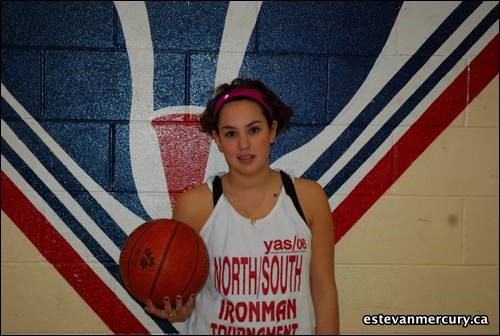With December upon us, so is the high school basketball season. The Estevan Comprehensive School senior girls' team just got back from their first tournament, and the players are looking forward to the rest of the season. All but one player that is.
Jaye Nicholas, a Grade 12 student at ECS, has been deemed ineligible to play basketball this year by the Saskatchewan High School Athletics Association (SHSAA) because of a rule that states from a time a student turns 16 or enters Grade 10 -whichever comes first - said student only has three consecutive years to compete in high school sports.
Nicholas, 18, went on a Rotary exchange to Taiwan for her Grade 11 school year in 2008-09, but because all her courses were in Chinese, the credits did not transfer over to her schooling in Canada.
When she returned to Estevan last year, she enrolled in Grade 11 and was able to play basketball, but due to the rule, it was her final year of eligibility.
According to Nicholas, her phys. ed. teacher, who is the SHSAA representative for ECS, informed her of the rule at the start of the school year and they decided to appeal the rule on her behalf, however it was quickly rejected.
"I had nothing to do with the appeal process at all because they (the SHSAA board) wouldn't take anything from me," said Nicholas. "I didn't even get a letter. My phys. ed. teacher showed me an e-mail they sent him, and all it said was that my request had been denied."
While she can still practise with the team, Nicholas is not permitted to participate in any league games or tournaments. She says she understands why the rule is in place, but feels in her case, since she missed a year to broaden her academic horizons, there should be an exception.
In a conversation with The Mercury, SHSAA executive director Kevin Vollet said the executive makes those decisions as a board, and that when they received Nicholas' appeal they discussed it at length.
"The executive did not approve the appeal based on the fact that this student made a choice to go out and explore the world, which is outstanding," Vollet said. "We understand, but the student made that choice to go on an excursion for a year and the unfortunate part is that her schooling where she went did not translate to the equivalent of Canadian education."
Vollet went on to say that the bylaw is very consistent across the country, and that they have heard appeals for many different reasons, including some similar to that of Nicholas'.
"It was a choice; it wasn't something that was out of her control, and that's the reason they (the board) upheld the eligibility rule, which is three consecutive years."
Nicholas says the most frustrating part is that she had plans of playing post-secondary basketball, but feels not being eligible to participate in her senior year will be detrimental to her chances to do so.
According to Vollet, that was one of the arguments raised when the executives were making their decision, but they didn't think it would hurt her.
"Coaches from institutions know the kids that are out there," he said. "She has the opportunity in the spring to play with Basketball Saskatchewan, which definitely gives her an opportunity as well."
It may not be that cut and dried, however. Not competing in games over the course of the season can hurt an athlete's development, especially in the all important transition period between high school and post-secondary sports.
"I understand why it's in place, but it's for kids who drop out of school or fail grades. I don't want to say I'm special, but I think my situation should be thought of as an exception," said Nicholas, who said she wishes there was more she could do about the situation but her hands are tied.
"Since the SHSAA won't speak to me directly about it, I have no idea what other steps I can take."




